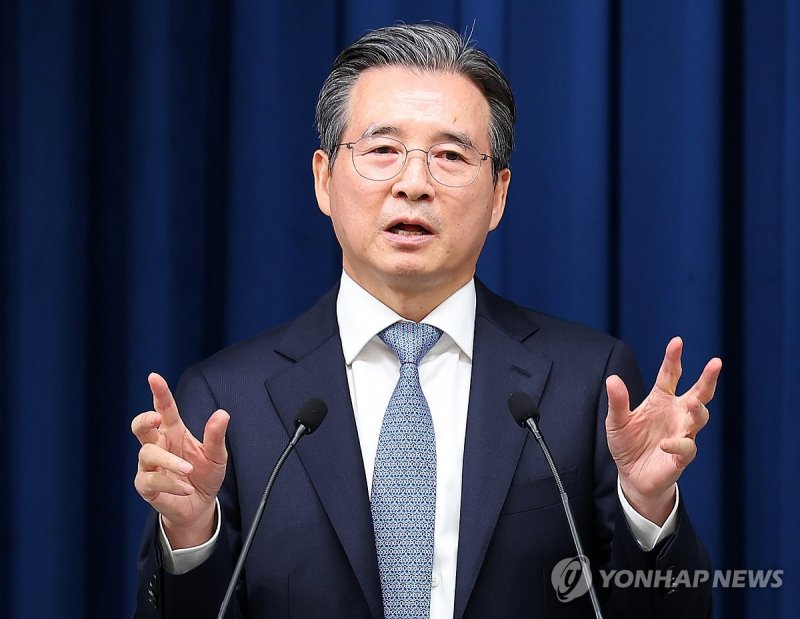Kim Yong-beom: "The U.S. Initially Demanded Over $350 Billion" [US-ROK Joint Fact Sheet Announcement]
- Input
- 2025-11-14 12:02:30
- Updated
- 2025-11-14 12:02:30

Kim Yong-beom, Policy Chief of the Office of the President of South Korea, revealed on the 13th that during the strategic investment negotiations between South Korea and the United States, "the U.S. initially demanded a much larger amount than $350 billion." This disclosure sheds light on the U.S. attempt to expand the scope of negotiations with South Korea to include sectors such as agriculture and semiconductors.
■ $350 Billion Finalized by Excluding Semiconductors... Investment and Tariff Package Confirmed
During the follow-up briefing on the US-ROK Joint Fact Sheet, Kim explained, "Semiconductors were ultimately excluded from the $350 billion Memorandum of Understanding (MOU) fund investment." He continued, "Originally, the negotiations involved a much larger amount, including semiconductors, but an agreement could not be reached. Therefore, the amount was finalized at $350 billion, as initially set at the end of July." Kim added, "With semiconductors excluded, the agreement was reached at $350 billion, and the fact sheet reflects our position that South Korea should not be placed at a disadvantage in the semiconductor sector."Kim emphasized, "The most important outcome is that the strategic investment MOU and tariff reduction agreements were clearly announced in the official statement." He also stated, "It was confirmed that there will be $150 billion in shipbuilding cooperation investment and $200 billion in strategic investment."
Regarding tariffs and trade, Kim explained, "Both sides agreed to a 15% mutual tariff reduction, and the Section 232 Tariffs currently imposed on Korean automotive parts and wood products will be adjusted to 15%." He continued, "For semiconductors, if an agreement is reached in the future with a country that has a larger semiconductor trade volume than South Korea, South Korea will be granted terms that are no less favorable." Kim also noted, "The agreement includes the elimination of tariffs on aircraft parts, generic drugs, and certain natural resources, which were not part of the July agreement."
Regarding the Foreign Exchange Market (Forex), Kim stated, "South Korea and the U.S. agreed that the MOU should not destabilize the Forex market and that any potential impact should be sufficiently discussed. As trusted partners, both countries set an annual funding cap of $20 billion, and if concerns about Forex instability arise, South Korea can request adjustments to the funding amount and payment schedule as a safeguard."
Discussions on non-tariff issues also continued. Kim said, "In the automotive sector, both sides agreed to abolish the cap that recognized South Korea’s safety standards for up to 50,000 U.S.-made vehicles per manufacturer annually." In agriculture, he stated, "No additional market opening was included, taking into account the sensitivity of products such as rice and beef." In the digital sector, Kim explained, "Both sides agreed in principle not to discriminate against U.S. companies in digital laws and regulations, including network usage fees and the Online Platform Regulation Act."
Regarding the distribution of profits from the $200 billion U.S. investment, Kim stated, "The 50:50 structure explained in Gyeongju will be maintained." He added that the MOU will include provisions to adjust the ratio in South Korea’s favor if the repayment of principal and interest becomes uncertain over the next 20 years.
■ Immediate Implementation of Tariff Reductions... Agreement on ‘Equal Treatment’ Principle for Non-Tariff Regulations
Regarding the timing of tariff reductions, Kim explained, "The mutual tariff reduction to 15% has been in effect since August 7. For automotive parts, the reduction will be retroactively applied from the first day of the month when a separate bill for implementing the strategic investment MOU is submitted to the National Assembly, and the bill is already prepared. Once the MOU is signed, the bill can be submitted immediately." He added, "For wood products and aircraft parts, the tariff reduction will take effect from the date the MOU is signed, while for generic drugs and certain natural resources, exemptions will be granted from the date agreed upon by the KORUS FTA Joint Committee."Regarding the export of High-Definition Maps (HD Maps) and the Online Platform Regulation Act, Kim said, "There were specific requests for the export of HD Maps, and negotiations on these items continued for quite some time." He added, "Since both sides agreed on the principle of ‘equal treatment,’ individual issues will continue to be discussed." Kim further noted, "Apple Inc. accepted the proposal presented by South Korea, while Google LLC still has differing views, so the situation varies by company."
Kim also stated, "We expect to sign the strategic investment MOU soon, and concrete measures for tariff reductions are currently being discussed with the U.S. side and will be announced shortly."
west@fnnews.com Sung Seok-woo Reporter